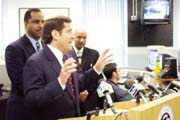Jersey City scored a victory in its fight against gun crime last week when city and federal officials appeared at police headquarters to announce that the federal Bureau of Alcohol, Tobacco, Firearms and Explosives [ATF] will open a satellite office at the Seventh Street police station downtown.
Described as a long-awaited and much needed boost to the city’s ongoing anti-gun campaign, the presence of the ATF special agents will greatly assist the Jersey City Police Department [JCPD] in a variety of ways, the most important being through the sharing of expertise and resources, said Chief of Police Ronald Buonocore Wednesday. ATF personnel will also contribute to the police department’s already existing gang and robbery units, eliminating bureaucratic red tape and allowing the JCPD to undertake more sting operations.
“The results will be a blessing for all of us,” Mayor Glenn Cunningham said.
The ATF satellite office will consist of at least two special agents operating regularly out of JCPD’s detectives’ headquarters on Seventh Street. The city is providing the ATF with office space and dedicated telephone lines so that special agents can link up to the bureau’s gun statistics database through the laptop computers they carry.
The importance of data
The bulk of the work the special agents will be doing with the JCPD, according to ATF Special Agent Joseph G. Green, revolves around “data mining,” an investigative process that culls information from both captured criminals and the recovered guns themselves.
Since guns in the Northeast usually get there through “straw purchasers” who take advantage of the Southern states’ more lenient gun control laws, tracking the sellers and purchasers in the interstate black market is the most efficient way at intercepting the exchange, Green said.
When a gun is newly-seized, ATF agents can cross-reference serial numbers and ballistics data from an enormous national database to target areas for investigation.
By questioning criminals, agents are given even more leads to pursue in their work at infiltrating the illegal gun trade. In addition to serial numbers and ballistics information, agents also look at data like resident information like ZIP codes and gun manufacture source dates.
And since time is of the essence in successfully tracking down gun sellers, the proximity between the two law enforcement agencies is what will facilitate the work.
“The ATF now has a permanent desk at the Jersey City Police Department,” said Congressman Steve Rothman at Wednesday’s press conference. “And it’s not for cosmetic or dramatic effect. It’s real in that [they will help the Jersey City Police intervene in gun trafficking].”
“The bad guys are on the run,” Rothman added. “They’re on notice.”
Fewer guns, better living
Jersey City residents will be especially glad to see those bad guys off city streets, said Mayor Cunningham, a former JCPD captain and U.S. Marshal. Describing Jersey City’s abundance of gun crimes as a serious issue, Cunningham described how he has received numerous complaints from city residents who say that hearing gunshots is a regular facet of daily life.
“If I would’ve remembered it, I would’ve brought you guys a video sent to me by a woman on Randolph Avenue to show you [how bad it is],” Cunningham said. “She videotaped a gun fight in front of her house from her window, standing behind the curtain.”
Police have seized 220 guns since January of this year, most of which were recovered through narcotics arrests. And law enforcement officials say that drug offenses, which have resulted in the arrest of 7,000 people in the last 18 months, are the leading source of gun violence in the city.
In addition, statistics that illustrate gun-related crime trends in Jersey City are alarmingly higher than national averages. According to a 2000 ATF report, when guns were recovered, a national average of 34 percent of them were associated with youths aged 18 to 24, while Jersey City had a 48 percent association rate.
Once the ATF sets up shop in Jersey City, the quality of life for all city residents will invariably improve, Cunningham added.
Sharing information with the federal agency will only further augment the success of the police department’s crime fighting strategies.
“While we’ve made tremendous inroads against street violence, working even more closely with the ATF can help us to directly target the proliferation of handguns on our streets,” Cunningham said in a release. “We owe a tremendous debt to Congressman Rothman, who has been a driving force in speaking up for Jersey City and making this day possible.”
Enticing the ATF
Convincing the federal agency to set up shop locally has been a two-year effort involving a great deal of lobbying. And Rothman, who sits on the House Appropriations Committee, was instrumental in that process.
Upon taking office in July 2001, Cunningham expressed to Rothman his desire to cut gun crime in Jersey City. Rothman, who said he’s concerned with issues concerning his constituents’ quality of life, used his position in Washington D.C. to commission an ATF study on gun crime in the state. The report, which revealed that 90 percent of firearms used in crimes in northern New Jersey are recovered either in Jersey City or Newark, was an indispensable tool in angling for an ATF office in Jersey City.
Mayor Cunningham traveled to the nation’s capital in March 2002 to make both a personal appeal to ATF Director Bradley Buckles and to explain how much of a positive impact an ATF satellite office would have on Jersey City. These efforts culminated in a provision in the federal 2003 spending bill expressing Congress’ support for a satellite office in Jersey City.
ATF’s New Jersey headquarters are currently located in Passaic County, spread across three offices in West Paterson, each housing an investigative group focusing solely on North Jersey. Teams from the New York and Philadelphia offices also can be used for operations in New Jersey.
